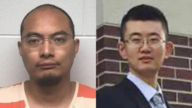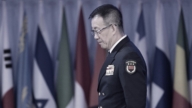【新唐人2011年7月18日讯】自江泽民病危及病死的消息传出以来,如何给江泽民盖棺定论,已成为中共当局极具争议和头痛的事情,甚至由此引发政治斗争。江泽民的生平劣迹,也引起海内外各界的关注。本台对江泽民的恶行丑事做出系列报导,今天的话题是江泽民“腐军弄权”。
江泽民踏着“六四”的鲜血登上总书记之位后,1991年苏联和东欧共产党解体。投靠陈云、李先念等左派元老的江泽民,高举“反和平演变”的大旗,推行极左路线,反对改革。
1992年初,邓小平由国家主席杨尚昆陪同南巡,直接点了江泽民的名,说“谁不改革谁下台”。而江却指令中宣部对邓南巡的报导要“统一口径”。随后,江在政治局扩大会议上,传达邓的南巡讲话,删去了其中大量内容。
92年3月人大会议上,军方总政治部主任杨白冰率先喊出:“为改革开放保驾护航”。《深圳特区报》率先披露了邓小平南巡及发表重要讲话。
江泽民受到来自杨氏兄弟、乔石、万里、田纪云等人的强大压力,而左派元老李先念6月病死。曾庆红分析,邓小平有可能用乔石代替江泽民做总书记,江被迫不得不支持改革。
邓小平怕改革路线被抛弃,更怕死后“六四”被平反﹔而杨尚昆开始就不愿意用军队镇压学生。于是,江泽民、曾庆红离间邓杨之间的关系,借邓之手解除了“杨家将”的军权,江后来害死了杨尚昆。
1995年初,北京市长陈希同联合7个省委,给邓小平写联名信,举报江泽民父亲是汉奸的秘密。而邓却把信交给了曾极力推荐江的薄一波处理。
江为此跪求薄一波。邓在薄的劝说下,放了江泽民一马。而薄一波则要江为他的儿子薄熙来加官晋爵。中共八元老之一的薄一波是整人能手,后来多次为江出谋划策迫害“法轮功”。
97年邓小平病逝。江泽民借北京副市长王宝森自杀事件,将陈希同以贪污受贿等罪判刑16年。江又借“远华走私案”,整治了邓为江安排保驾的军委副主席刘华清。
江为保权位,在军队中大肆培植亲信,97年一年内就提拨了各级将军530名,军委副主席张万年、郭伯雄、总政治部主任于永波等人,成了江的铁杆心腹。
江当上军委主席后,放纵军队大肆经商,军队出现了前所未有的腐败,比地方腐败更严重,军队走私物品无所不有,甚至包括毒品。
伍凡(《中国事务》主编):“他把那些老军头一个个都赶走,提拨他的人,就是用腐败、女色、金钱来收买这些高级将领,为他服务,这个军队变成是党军、变成是江泽民的家军。”
98年朱镕基总理讲:近年来每年走私8千亿,军方是大户,至少5千亿。光98年上半年军队开枪、开炮打死海关缉私公安武警450人,打伤2200多人。他们还冒用总理签字,随便盖上军委副主席大印就冒领20亿,事情到江那里就被压下了。
98年国防部长迟浩田讲:每年军费有50%以上花在高中级干部吃喝、出国旅游、豪华轿车住宅上。加上走私和经商,军中干部98年实际挥霍相当于当年军费940亿的7倍以上。
2002年上半年,中共中央政治局通过了关于“江全退”的决议。而江泽民10月出访美国后,在十六大上,江策划授意张万年等人搞军事政变,江成功的留任军委主席。
2003年初,政治局召开组织生活会,李瑞环等人对江提出了六个方面近40条意见,其中包括:专权、搞独裁、个人崇拜、树碑立传、到处作秀、严重损害中国的国际形象等等。
2004年8月26号,39军的3百多名老军人冲进中南海,举着花圈说是献给江泽民,要求江下台。洪学智、刘华清、杨白冰等老将军提出,“江全退”的时候到了。
9月1号,江给政治局写信假意“请辞”军委主席,同时策动亲信“挽留”他。不料,在13号的政治局扩大会议上,被江提拔的军委委员徐才厚、梁光烈、李继耐等人纷纷表态,支持江的“请辞”。
江的摄政曾庆红一看风头不对,也赞成江下台。江被迫在十六届四中全会上交出了军委主席的职务。但是,江在党政军中仍有相当大的影响力。
伍凡:“一个最典型例子,四川汶川地震的时候,温家宝想调军队(救灾)调不动,他们一定要听不是军委主席的江泽民、要听他的命令,连胡锦涛军委主席也调不动,所以这个军队完全变成一个私人军队了。”
在2007年十七大上,江泽民、曾庆红再次将多名亲信塞进了政治局常委会,把胡锦涛选定的接班人李克强挤了下来,并试图左右2012年十八大的人事布局。
2009年4月,乔石、李瑞环罕见的突然发声,支持由胡温主导十八大人事布局。此后,江派、太子党、胡温团派,就薄熙来“唱红打黑”、习近平进入军委等,展开了一系列的权力斗争较量。
自2010年起,江泽民开始失势,再也没有在党报和官方活动中露过面。胡锦涛开始主导军方人事布局。今年7月,海外媒体相继传出江病危及病死的消息,江系人马纷纷寻找后路,江泽民正式走向退出政治舞台。
新唐人记者常春、李元翰周天采访报导。
Truth of Jiang Zemin: Part VI
Jiang Zemin’s death or illness has led to a dispute in
the Chinese Communist Party (CCP) regarding Jiang’s life.
Jiang’s notorious deeds have attracted wide attention.
NTD is making a series of reports on Jiang’s life.
Today’s topic is Jiang’s politicking within
the Chinese Communist Party’s (CCP) corrupt army.
Due to his role in Tiananmen Massacre in 1989,
Jiang Zemin became the CCP’s General Secretary.
In 1991, the former Soviet Union and the Communist Eastern Bloc disintegrated.
Under the protection of CCP leftist veterans Chen Yun and Li Xiannian,
Jiang Zemin was advocating the ultra-left line and against reforms.
In early 1992, Deng Xiaoping was accompanied
by the CCP’s then-President Yang Shangkun on his southern tour.
Deng specifically mentioned Jiang’s name and
said “the one who does not reform will step down.
" Meanwhile, Jiang ordered the Central Propaganda Department
to unify their statements regarding Deng’s southern tour.
Subsequently, on an expanded meeting of the Politburo,
when conveying Deng’s speeches made on his southern tour,
Jiang deleted a large amount of contents.
On National People’s Congress held in March 1992,
the CCP’s military General Political Department Director Yang Baibing
shouted: “To defend the reform and opening up."
Shenzhen Special Zone Daily was the first to disclose Deng’s southern tour speeches.
Jiang was under a lot of pressure from many CCP veterans,
including Yang Shangkun, Qiao Shi, Wan Li and Tian Jiyun.
In June 1992, Jiang’s backer, left-wing elder Li Xiannian died.
Jiang’s subordinate Zeng Qinghong analyzed that
Deng could be planning to appoint Qiao Shi to be the next CCP General Secretary, instead of Jiang.
To secure his position, Jiang was compelled to support the reform.
Deng feared that his reform would be abandoned.
He feared more of the vindication of Tiananmen Movement.
Yang was reluctant at the beginning of the crackdown to use troops to suppress the students.
So, Jiang and Zeng Qinghong set Deng at loggerheads with Yang.
Jiang used Deng to take away Yang’s military power.
Eventually, Jiang murdered Yang Shangkun.
In early 1995, Beijing’s Mayor Chen Xitong and
seven other provincial CCP committee leaders wrote a joint letter to Deng,
exposing that Jiang’s father was a traitor to China.
Deng told Bo Yibo to handle the matter.
One of the CCP’s Eight Elders, Bo highly recommended Jiang in the past.
Jiang begged Bo on his knees. Bo later persuaded Deng to forgive Jiang.
In exchange, Bo Yibo asked from Jiang high-ranking positions for his son, Bo Xilai.
Bo Yibo was an expert in abusing people.
He later gave Jiang lots of advice on how to persecute Falun Gong practitioners.
Deng died in 1997. Using the suicide of Beijing’s deputy mayor Wang Baosen,
Jiang sentenced Chen Xitong to 16 years in prison for bribery and corruption.
Jiang also used “Yuanhua Smuggling Case" to force
Central Military Commission (CMC) Vice Chair Liu Huaqing to resign.
Liu was previously arranged by Deng to assist Jiang in the army.
To protect his position, Jiang wantonly planted his cronies in the military.
In 1997 alone, he promoted 530 generals.
CMC’s Vice Chair Zhang Wannian, as well as Guo Boxiong and
General Political Department Director Yu Yongbo all became Jiang’s confidants.
After becoming the CMC chair, Jiang allowed the army to indulge in running businesses.
There was an unprecedented corruption in the military.
It even surpassed the corruption of local governments.
The armed forces smuggled all kinds of goods, including narcotics.
Wu Fan (China Affairs Editor-in-Chief): “He (Jiang) drove away all the veteran military officials.
He promoted and bought hundreds of high-ranking military officials with women and money.
The Chinese army was turned into the CCP’s army and Jiang’s own private army.”
In 1998, the then-Premier Zhu Rongji said,
in recent years, goods worth RMB 800 billion were smuggled annually.
The military alone accounted for at least RMB 500 billion.
In the first half of 1998 alone,
the military smugglers opened fire and killed 450 anti-smuggling police officials and injured 2,200 more.
The military even forged the Premier’s signature and embezzled RMB 2 billion.
All investigations regarding such cases were smothered by Jiang.
In 1998, defense minister Chi Haotian said,
over 50% of the annual military expenditure was incurred by high-ranking cadres on banquets,
overseas travels and luxury houses and cars.
With the income from smuggling and conducting businesses,
in 1998, the actual military cadres squandered 7 times of the RMB 94 billion military expenditure.
In 2002, the CCP’s Central Committee Politburo passed a resolution to let “Jiang step down."
On the CCP’s 16th National Congress in Nov 2002,
Jiang ordered Zhang Wannian to stage a military coup.
As a result, Jiang successfully remained the Chair of Central Military Commission.
In early 2003, the Politburo organized a session of criticizing and self-criticizing.
Members of the Politburo, including Li Ruihuan, made nearly 40 negative comments about Jiang.
They included exclusive privileges, authoritarian rule, personal cult,
personal glorification and seriously damaging China’s international image.
On Aug. 26, 2004, over 300 veteran soldiers burst into Zhongnanhai,
holding a wreath dedicated to Jiang.
They demanded Jiang to step down.
Old generals, including Hong Xuezhi, Liu Huaqing and Yang Baibing, proposed that Jiang should retire entirely.
On Sep. 1, 2004, Jiang wrote to the Politburo, pretending to resign.
Meanwhile, he instigated his cronies to “retain" him.
Unexpectedly, on a Politburo meeting held on Sep. 13, many CMC members,
who were promoted by Jiang, supported Jiang’s “resignation.”
Sensing a change of political climate, Jiang’s “regent” Zeng Qinghong also supported Jiang’s resignation.
Jiang was forced to resign later.
However, he still had considerable influence on the military and politics.
Wu Fan: “A typical example is that when Wenchuan earthquake took place in 2008,
CCP’s Premier Wen Jiabao wanted to dispatch the army to help with the relief efforts, but couldn’t do so.
The army only wanted to receive civilian Jiang Zemin’s orders.
Even the chair of CMC, Hu Jintao, couldn’t dispatch the army.
The army had been turned into Jiang’s private army.”
In 2007 CCP’s National Congress, Jiang and Zeng Qinghong promoted many of their cronies into the Politburo Standing Committee.
Hu Jintao’s chosen successor Li Keqiang was squeezed out.
Jiang and Zeng tried to manipulate the personnel arrangement for the 2012 National Congress.
In April 2009, the usually silent Qiao Shi and Li Ruihuan suddenly supported
the personnel arrangement of the Hu-Wen-led 18th National Congress.
Since then, the Jiang’s faction, Crown Prince Party and the Hu-Wen camp had
a series of battles on various issues, such as Bo Xilai’s “red song singing."
Since 2010, Jiang began to lose power.
He was no longer seen in CCP’s newspapers or official activities.
Hu began to dominate the arrangement of military personnel.
In early July, 2011, the foreign media reported Jiang’s death.
Jiang’s followers are looking for a way out for themselves.
Jiang formally withdrew from the political arena.
NTD reporters Chang Chun, Li Yuanhan and Zhou tian



























